Thai Pongal is a four-day festival that is celebrated by Hindus all across the world to show gratitude and to pray for a good harvest.
This festival falls in the month of Thai in the Tamil Calendar (January and February season) when the crops are harvested. It is celebrated mainly to thank all the gods (Especially the god of the sun) and other natural elements, cattle who help for farming and for the existence of the world. This is also the festival that marks the start of the Sun’s journey from its Southernmost point towards the North, which is considered an auspicious event.
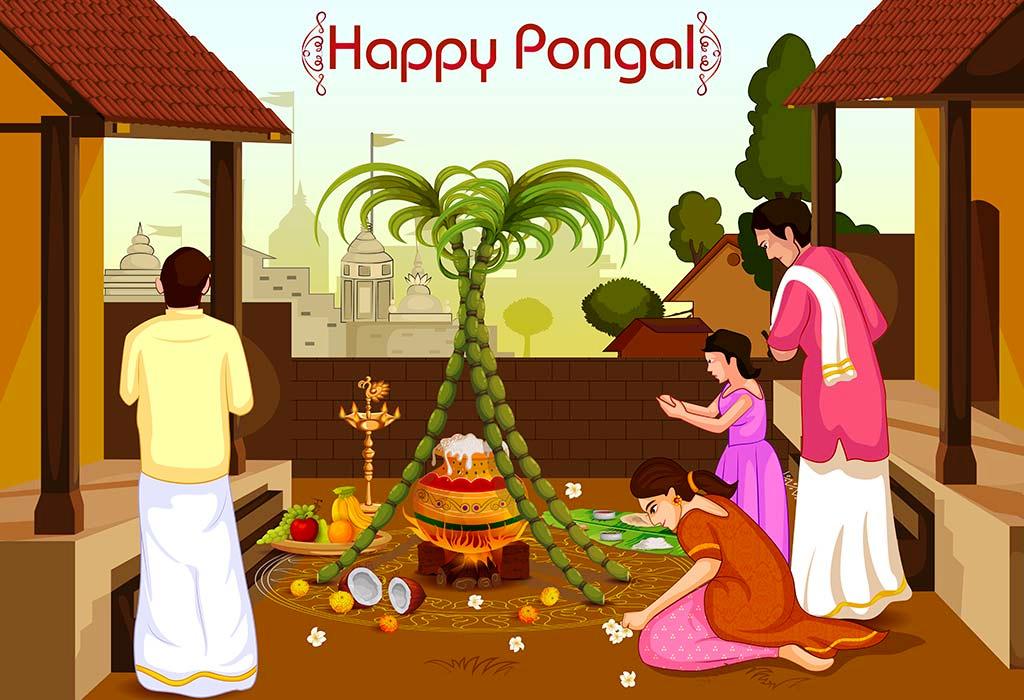
The history of the Pongal festival runs back a long way. It is proven that its history goes back as far as 1070-1122 CE. The recipe of the Pongal dish also has its own history. It has appeared in various names and slightly different recipes with time. But in inscriptions from the Chola dynasty onwards a detailed recipe similar to the Pongal dish of the modern era was discovered. There are various traditions and customs that Hindus follow prior to the festivities. The houses and places of worship are washed and painted and people buy new clothes. They decorate their houses and places of worship with garlands of flowers and beautifully drawn colourful patterns of Kolam.
This festival is celebrated for four days. On the first day of Bhogi Pongal, people decorate their houses with kolam patterns. Kolam patterns are believed to bring good luck. It also symbolizes happiness and prosperity and as it is fed by insects and birds, it also symbolizes human’s concern for all living beings.
On the second day which is the Thai Pongal day people prepare Pongal and offer it to the gods and goddesses. People dress up in their newly bought costumes and prepare their main food, the Pongal dish. This is prepared in a new and beautifully decorated clay pot. The Pongal dish is made using rice, milk, green gram, jaggery, cashew nuts, raisins, and spices. The third day, Mattu Pongal is the day devoted to Cattle for farmers to honor them and show gratitude.
Cattle are bathed in turmeric water and decorated with Kumkum, shiny horn caps, and flower garlands. On this day Manju Virattu, a game where the money is tied on the bulls’ horns and chased by young men is played. The final day of the festival, Kaanum Pongal is the day when youngsters worship their elders and gifts are exchanged. Although it is celebrated for four days by Hindus, in Sri Lanka it is only limited to two days.
This festival brings joy and colour to peoples’ lives regardless of their wealth, caste, and other factors, joining them in harmony.
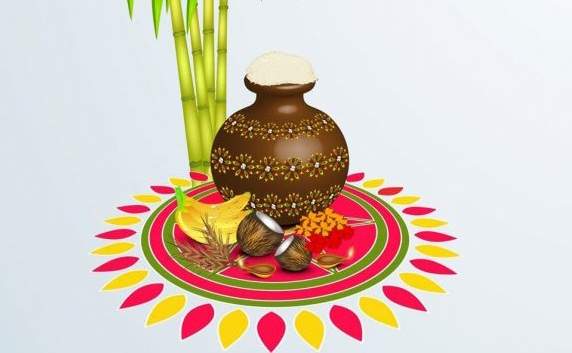
தைப்பொங்கல் – நன்றிக்கான பண்டிகை
தைப்பொங்கல் நான்கு நாட்கள் கொண்டாடப்படும் ஒரு பண்டிகையாகும். இது உலக வாழ் இந்துக்களால் நன்றி செலுத்துவதை உணர்த்துவதற்கும், சிறந்ததொரு அறுவடைக்காகவும் கொண்டாடப்படுகிறது.
இப்பண்டிகை தமிழ் நாட்காட்டியில் தை மாதத்தில் கொண்டாடப்படும் (ஆங்கில நாட்காட்டியில் ஜனவரி மற்றும் பெப்ரவரி மாதத்திற்குள்) அதாவது பயிர்களை அறுவடை செய்யும் பொழுது இது கொண்டாடப்படுகிறது. இப்பண்டிகை கொண்டாடப்படுவதன் முக்கிய நோக்கம் விவசாயத்திற்காகவும், உலகத்தின் நிலைப்பிற்காகவும் உதவும் அனைத்து கடவுள்களையும் (மிக முக்கியமாக சூரிய பகவான்), இயற்கை அம்சங்களையும், விவசாயிகளையும், பசுக்களையும் போற்றவும் அவர்களுக்கு நன்றி செலுத்துவதற்குமாகும். அத்துடன், இப்பண்டிகை சூரிய பகவான் தெற்கு திசையிலிருந்து வடக்கு திசைக்கு சஞ்சாரிக்கும் பயணத்தையும் குறிப்பிடுகின்றது. இந்நிகழ்ச்சி சுப நிகழ்ச்சியாகவும் கருதப்படுகிறது.
தைப்பொங்கல் பண்டிகையின் வரலாறு மிகத்தொன்மையானது. இதன் வரலாறு கி.பி 1070-1122 இற்கு உட்பட்டது என்று நிரூபிக்கப்பட்டுள்ளது. பொங்கல் உணவின் செயல்முறைக்கு ஒரு தனிப்பட்ட வரலாறு உள்ளது. இது பல பெயர்களாலும், விதவிதமான செயல்முறைகளாலும் செய்யப்பட்டதாக கூறப்படுகிறது. ஆனால், சோழர் கால கல்வெட்டுக்களில் தற்கால பொங்கல் செய்யும் செயல்முறைக்கு ஒத்த ஒரு உணவு செயல்முறை உள்ளதாக கண்டறியப்பட்டுள்ளது.
பொங்கல் பண்டிகைக்கு முன் இந்துக்கள் பல விதமான சம்பிரதாயங்கள் மற்றும் பழக்கவழக்கங்களை பின்பற்றுவர். வீடுகள் மற்றும் வழிபடுமிடங்களை கழுவி சுத்தமாக்கி சுவர்களை வர்ணம் தீட்டுவர். அத்துடன், தமிழ் மக்கள் புத்தாடைகளை வாங்குவர். வீடுகளும் வழிபடுமிடங்களும் மலர்மாலைகளாலும் பல வர்ண கோலங்களாலும் அலங்கரிக்கப்படும். இப்பண்டிகை நான்கு நாட்கள் கொண்டாடப்படும். முதல் நாள் போகிப் பண்டிகை கொண்டாடப்படும். இத்தினத்தில் இந்துக்கள் வீடுகளை கோலமிட்டு அலங்கரிப்பர். கோலங்கள் வீட்டுக்கு அதிர்ஷ்டத்தை கொண்டு வருமென நம்பப்படுகிறது. கோலங்கள் சந்தோஷத்தையும், முன்னேற்றத்தையும் குறிப்பிடுவதாக நம்பப்படுகின்றது. அத்துடன் பூச்சிகள் மற்றும் குருவிகளுக்கு உணவளிக்கும் செயலாகவும் கருத முடியும். இந்நிகழ்வு பிற உயிர்கள் மேல் மனிதர்களுக்குள்ள அக்கறையை பிரதிபலிக்கிறது.
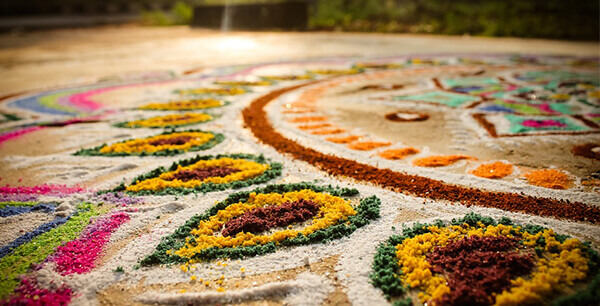
இரண்டாம் நாள் தைப்பொங்கல் தினமாகும். இத்தினத்தன்று புது மண் பானையில் வீடுகளில் பொங்கல் சமைத்து அதனை இந்துக்கள் கடவுளிற்கு படைப்பர். பொங்கல் பச்சரிசி, பால், பாசிப்பயறு, வெல்லம், முந்திரிப்பருப்பு, உலர்த்தப்பட்ட திராட்சைகள், மற்றும் ஏனைய சுவையூட்டிகளிட்டு செய்யப்படும் உணவாகும். பொங்கல் தினத்தன்று மக்கள் புத்தாடை அணிந்து கோயிலிற்கு செல்வர்.
மூன்றாம் நாள் மாட்டுப்பொங்கல் தினமாகும். இத்தினம் கொண்டாடப்படுவதன் நோக்கம் உழவுக்கு உதவும் பசுக்களுக்கு நன்றி செலுத்துவதற்காகும். இத்தினத்தன்று பசுக்களை மஞ்சள் நீரில் நீராட்டி, குங்குமமிட்டு, மலர் மாலையிட்டு அலங்கரிப்பர். மாட்டுப்பொங்கல் தினத்தன்று “மஞ்சு விரட்டு” என்றொரு போட்டியும் நிகழ்த்தப்படுகின்றது. மாட்டுக்கொம்பில் பணம் கட்டப்பட்டு அதனை இளம் வாலிபர்கள் துரத்துவதே இப்போட்டியாகும்.
நான்காம் மற்றும் இறுதி நாள் காணும் பொங்கல் என்று அழைக்கப்படுகின்றது. இந்நாள் இளைஞர்கள் வயோதிபர்களை வழிபட்டு பரிசுகளை பரிமாறிக்கொள்வர். இப்பண்டிகை இந்துக்களால் நான்கு நாட்கள் கொண்டாடப்பட்டாலும், இலங்கையில் இரண்டு நாட்கள் மட்டுமே கொண்டாடப்படுகிறது.
தைப்பொங்கல் செல்வம், ஜாதி மற்றும் ஏனைய வேறுபாடுகள் எதுவுமின்றி அனைவரது வாழ்விலும் ஆனந்தத்தையும் ஒற்றுமையையும் விருத்தி செய்ய கொண்டாடப்படுகிறது .
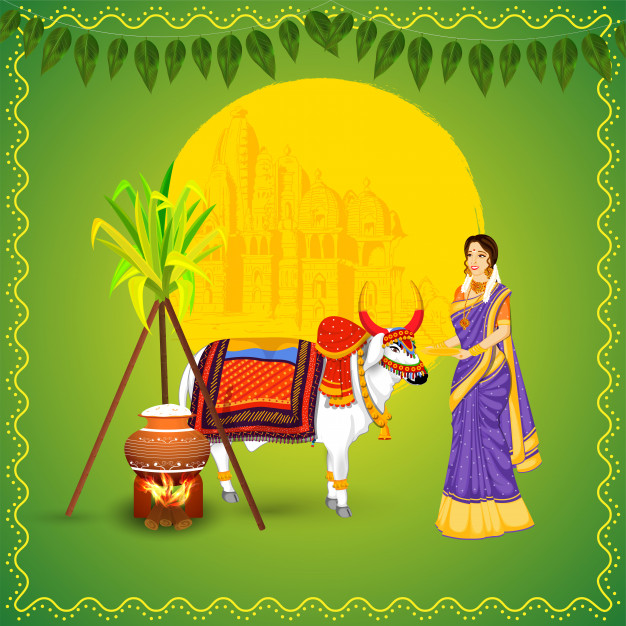
තෛපොංගල් – කෘතඥතාවයේ උත්සවය
තෛපොංගල් යනු දින හතරක උත්සවයක් වන අතර එය ලොව පුරා සිටින දෙමළ ජනයා විසින් කෘතඥතාව දැක්වීමට සහ හොඳ අස්වැන්නක් ඉල්ලා යාච්ඥා කිරීමට සමරනු ලැබේ.
මෙම උත්සවය දෙමළ දින දර්ශනයේ තෛ මාසයේ (ජනවාරි සහ පෙබරවාරි සමය) අස්වැන්න නෙළන කාලයේ යෙදේ. ප්රධාන වශයෙන් ඔවුන්ගේ භෝග වලින් හොඳ අස්වැන්නක් ලබා ගැනීම සඳහා දෙවිවරුන් සහ අනෙකුත් ස්වාභාවික මූලධාතූන් මෙන්ම ගවයින් වන්දනාමාන කිරීමට සමරනු ලැබේ. සූර්යයාගේ දකුණු කෙළවරේ සිට උතුර දෙසට යන ගමනේ ආරම්භය සනිටුහන් කරන උත්සවය මෙය වන අතර එය මංගල සිදුවීමක් ලෙස සැලකේ.
පොංගල් උත්සවයේ ඉතිහාසය බොහෝ අතීතයට විහිදී යයි. එනම් ක්රි.ව. 1070-1122 පමණ කාලය දක්වා දිව යයි. පොංගල් කෑමේ වට්ටෝරුවට ද එයටම අනන්ය වූ ඉතිහාසයක් ඇත. එයට කාලයත් සමඟ විවිධ නම් සහ තරමක් වෙනස් වට්ටෝරු පැවතී තිබේ. නමුත් චෝළ රාජවංශයේ සෙල්ලිපිවලින් නූතන යුගයේ පොංගල් කෑමට සමාන වට්ටෝරුවක් සොයා ගෙන ඇත.
උත්සවයට පෙර හින්දු භක්තිකයන් අනුගමනය කරන විවිධ සම්ප්රදායන් හා චාරිත්ර තිබේ. ගෙවල් සහ පූජනීය ස්ථාන සෝදා තීන්ත ආලේප කර, මල් මාලා සහ අලංකාර ලෙස වර්ණාලේප කරන ලද කෝලම් වලින් සරසනු ලබයිග මිනිසුන් නව ඇඳුම් මිලදී ගනී.
මෙම උත්සවය දින හතරක් සමරනු ලැබේ. පළමු දින වන භෝගි පොන්ගල්හි මිනිසුන් තම නිවෙස් කෝලම් රටා වලින් සැරසීම සිදු කරයි. මෙම කෝලම් රටා වාසනාව ගෙන එනු ඇතැයි විශ්වාස කෙරේ. එය සතුට හා සමෘද්ධිය සංකේතවත් කරන අතර එය කෘමීන් හා පක්ෂීන් විසින් අනුභව කරනු ලබන බැවින්, කෝලම් සියලු ජීවීන් කෙරෙහි මිනිසා දක්වන සැලකිල්ල ද සංකේතවත් කරයි.
තෛපොංගල් දිනය වන දෙවන දිනයේ මිනිසුන් පොංගල් සූදානම් කර දෙවිවරුන්ට පූජා කරති. මිනිසුන් අලුතින් මිලදී ගත් ඇඳුම් වලින් සැරසී ඔවුන්ගේ ප්රධාන ආහාරය වන පොංගල් කෑම පිළියෙළ කරයි. මෙය අලංකාර ලෙස සරසා ඇති නව මැටි බඳුනක සකසා ගැනේ. පොංගල් කෑමක් සාදනු ලබන්නේ සහල්, කිරි, මුං ඇට, හකුරු, කජු, මුද්දරප්පලම් සහ කුළුබඩු භාවිතා කරමිනි. තෙවන දිනය වන මට්ටු පොංගල් යනු ගවයින්ට ගෞරවය සහ කෘතඥතාව දැක්වීම සඳහා ගවයන් වෙනුවෙන් කැප කළ දිනයයි. ගවයින් කහ ජලයේ ස්නානය කර කුම්කුම්, දිලිසෙන අං වැසුම් සහ මල් මාල වලින් සරසයි. මේ දවසේ මාජි විරාට්ටු නම් ගොනුන් මත මුදල් බැඳ තරුණයන් එම මුදල් ලබා ගැනීම සඳහා ගවයන් පසුපස පන්නා යනු ලබන ක්රීඩාවක් සිදු කරයි.
උත්සවයේ අවසාන දිනය වන කානුම් පොංගල් දිනයේදී තරුණයින් තම වැඩිහිටියන්ට නමස්කාර කරන අතර තෑගි හුවමාරු කර ගනී. එය දින හතරක් හින්දු භක්තිකයන් විසින් සමරනු ලැබුවද ශ්රී ලංකාවේ එය දින දෙකකට පමණක් සීමා වේ.
මෙම උත්සවය ධනය, කුලය ආදී සියලු සාධක නොසලකමින් ජනතාවගේ ජීවිතවලට ප්රීතිය හා නැවුම් වර්ණයක් ගෙන එයි.
English Article: Rtr. Nethmi Wimalasena
Tamil Article: Rtr. Srinath Udayachandran
Sinhala Article: Rtr. Nishmi Nishara
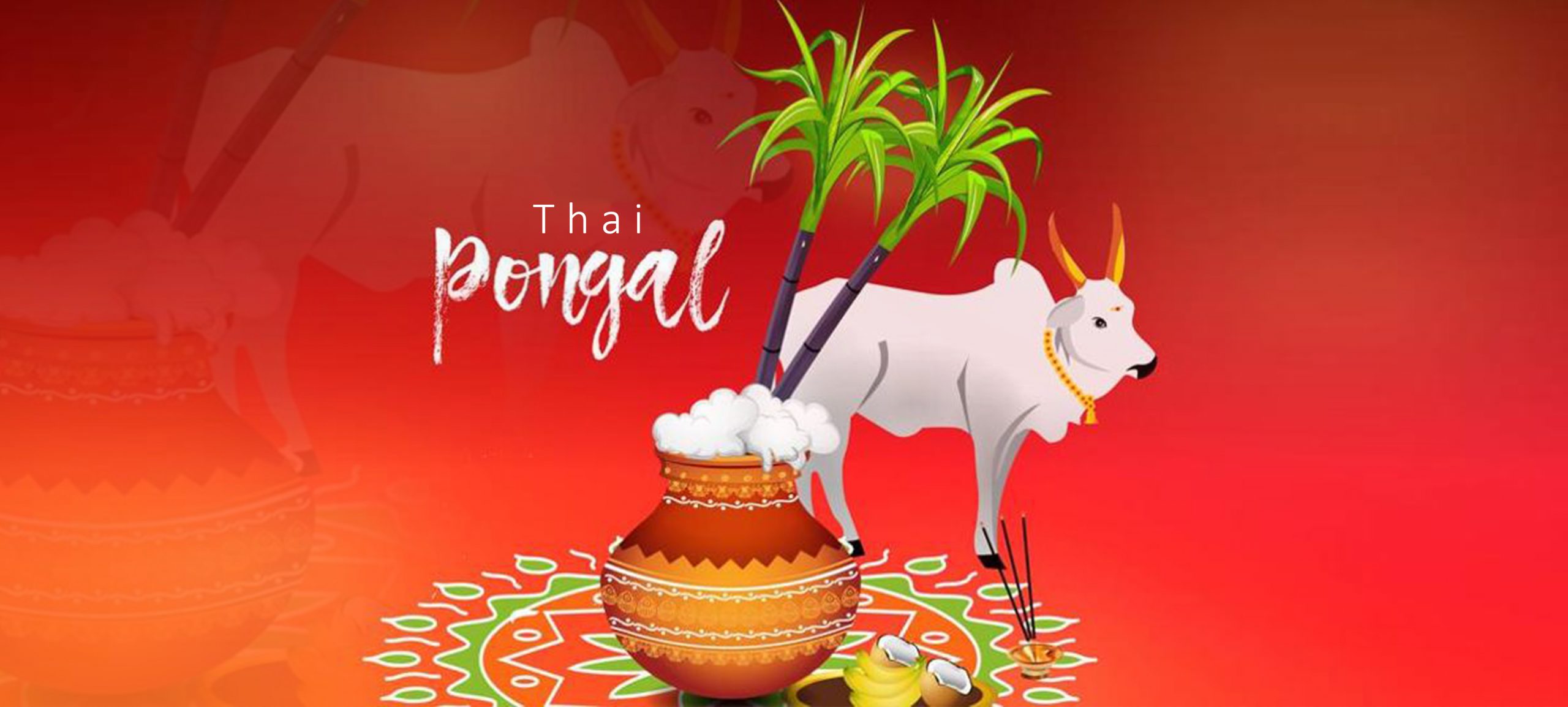

0 Comments